- Home
- Philip Pullman
His Dark Materials 01 - The Golden Compass Page 9
His Dark Materials 01 - The Golden Compass Read online
Page 9
"She's very clever," said Lyra. Before this evening she would have said much more, but things were changing.
"Yes, but personally," Adele Starminster insisted. "I mean, is she friendly or impatient or what? Do you live here with her? What's she like in private?"
"She's very nice," said Lyra stolidly.
"What sort of things do you do? How do you help her?"
"I do calculations and all that. Like for navigation."
"Ah, I see....And where do you come from? What was your name again?"
"Lyra. I come from Oxford."
"Why did Mrs. Coulter pick you to—"
She stopped very suddenly, because Mrs. Coulter herself had appeared close by. From the way Adele Starminster looked up at her, and the agitated way her daemon was fluttering around her head, Lyra could tell that the young woman wasn't supposed to be at the party at all.
"I don't know your name," said Mrs. Coulter very quietly, "but I shall find it out within five minutes, and then you will never work as a journalist again. Now get up very quietly, without making a fuss, and leave. I might add that whoever brought you here will also suffer."
Mrs. Coulter seemed to be charged with some kind of anbaric force. She even smelled different: a hot smell, like heated metal, came off her body. Lyra had felt something of it earlier, but now she was seeing it directed at someone else, and poor Adele Starminster had no force to resist. Her daemon fell limp on her shoulder and flapped his gorgeous wings once or twice before fainting, and the woman herself seemed to be unable to stand fully upright. Moving in a slight awkward crouch, she made her way through the press of loudly talking guests and out of the drawing room door. She had one hand clutched to her shoulder, holding the swooning daemon in place.
"Well?" said Mrs. Coulter to Lyra.
"I never told her anything important," Lyra said.
"What was she asking?"
"Just about what I was doing and who I was, and stuff like that."
As she said that, Lyra noticed that Mrs. Coulter was alone, without her daemon. How could that be? But a moment later the golden monkey appeared at her side, and, reaching down, she took his hand and swung him up lightly to her shoulder. At once she seemed at ease again.
"If you come across anyone else who obviously hasn't been invited, dear, do come and find me, won't you?"
The hot metallic smell was vanishing. Perhaps Lyra had only imagined it. She could smell Mrs. Coulter's scent again, and the roses, and the cigarillo smoke, and the scent of other women. Mrs. Coulter smiled at Lyra in a way that seemed to say, "You and I understand these things, don't we?" and moved on to greet some other guests.
Pantalaimon was whispering in Lyra's ear.
"While she was here, her daemon was coming out of our bedroom. He's been spying. He knows about the alethiometer!"
Lyra felt that that was probably true, but there was nothing she could do about it. What had that professor been saying about the Gobblers? She looked around to find him again, but no sooner had she seen him than the commissionaire (in servant's dress for the evening) and another man tapped the professor on the shoulder and spoke quietly to him, at which he turned pale and followed them out. That took no more than a couple of seconds, and it was so discreetly done that hardly anyone noticed. But it left Lyra feeling anxious and exposed.
She wandered through the two big rooms where the party was taking place, half-listening to the conversations around her, half-interested in the taste of the cocktails she wasn't allowed to try, and increasingly fretful. She wasn't aware that anyone was watching her until the commissionaire appeared at her side and bent to say:
"Miss Lyra, the gentleman by the fireplace would like to speak to you. He's Lord Boreal, if you didn't know."
Lyra looked up across the room. The powerful-looking gray-haired man was looking directly at her, and as their eyes met, he nodded and beckoned.
Unwilling, but more interested now, she went across.
"Good evening, child," he said. His voice was smooth and commanding. His serpent daemon's mailed head and emerald eyes glittered in the light from the cut-glass lamp on the wall nearby.
"Good evening," said Lyra.
"How is my old friend the Master of Jordan?"
"Very well, thank you."
"I expect they were all sorry to say goodbye to you."
"Yes, they were."
"And is Mrs. Coulter keeping you busy? What is she teaching you?"
Because Lyra was feeling rebellious and uneasy, she didn't answer this patronizing question with the truth, or with one of her usual flights of fancy. Instead she said, "I'm learning about Rusakov Particles, and about the Oblation Board."
He seemed to become focused at once, in the same way that you could focus the beam of an anbaric lantern. All his attention streamed at her fiercely.
"Suppose you tell me what you know," he said.
"They're doing experiments in the North," Lyra said. She was feeling reckless now. "Like Dr. Grumman."
"Go on."
"They've got this special kind of photogram where you can see Dust, and when you see a man, there's like all light coming to him, and there's none on a child. At least, not so much."
"Did Mrs. Coulter show you a picture like that?"
Lyra hesitated, for this was not lying but something else, and she wasn't practiced at it.
"No," she said after a moment. "I saw that one at Jordan College."
"Who showed it to you?"
"He wasn't really showing it to me," Lyra admitted. "I was just passing and I saw it. And then my friend Roger was taken by the Oblation Board. But—"
"Who showed you that picture?"
"My Uncle Asriel."
"When?"
"When he was in Jordan College last time."
"I see. And what else have you been learning about? Did I hear you mention the Oblation Board?"
"Yes. But I didn't hear about that from him, I heard it here."
Which was exactly true, she thought.
He was looking at her narrowly. She gazed back with all the innocence she had. Finally he nodded.
"Then Mrs. Coulter must have decided you were ready to help her in that work. Interesting. Have you taken part yet?"
"No," said Lyra. What was he talking about? Pantalaimon was cleverly in his most inexpressive shape, a moth, and couldn't betray her feelings; and she was sure she could keep her own face innocent.
"And has she told you what happens to the children?"
"No, she hasn't told me that. I only just know that it's about Dust, and they're like a kind of sacrifice."
Again, that wasn't exactly a lie, she thought; she had never said that Mrs. Coulter herself had told her.
"Sacrifice is rather a dramatic way of putting it. What's done is for their good as well as ours. And of course they all come to Mrs. Coulter willingly. That's why she's so valuable. They must want to take part, and what child could resist her? And if she's going to use you as well to bring them in, so much the better. I'm very pleased."
He smiled at her in the way Mrs. Coulter had: as if they were both in on a secret. She smiled politely back and he turned away to talk to someone else.
She and Pantalaimon could sense each other's horror. She wanted to go away by herself and talk to him; she wanted to leave the flat; she wanted to go back to Jordan College and her little shabby bedroom on Staircase Twelve; she wanted to find Lord Asriel—
And as if in answer to that last wish, she heard his name mentioned, and wandered closer to the group talking nearby with the pretext of helping herself to a canape from the plate on the table. A man in a bishop's purple was saying:
"...No, I don't think Lord Asriel will be troubling us for quite some time."
"And where did you say he was being held?"
"In the fortress of Svalbard, I'm told. Guarded by panserbjørne—you know, armored bears. Formidable creatures! He won't escape from them if he lives to be a thousand. The fact is that I really think the way i
s clear, very nearly clear—"
"The last experiments have confirmed what I always believed—that Dust is an emanation from the dark principle itself, and—"
"Do I detect the Zoroastrian heresy?"
"What used to be a heresy—"
"And if we could isolate the dark principle—"
"Svalbard, did you say?"
"Armored bears—"
"The Oblation Board—"
"The children don't suffer, I'm sure of it—"
"Lord Asriel imprisoned—"
Lyra had heard enough. She turned away, and moving as quietly as the moth Pantalaimon, she went into her bedroom and closed the door. The noise of the party was muffled at once.
"Well?" she whispered, and he became a goldfinch on her shoulder.
"Are we going to run away?" he whispered back.
"'Course. If we do it now with all these people about, she might not notice for a while."
"He will."
Pantalaimon meant Mrs. Coulter's daemon. When Lyra thought of his lithe golden shape, she felt ill with fear.
"I'll fight him this time," Pantalaimon said boldly. "I can change and he can't. I'll change so quickly he won't be able to keep hold. This time I'll win, you'll see."
Lyra nodded distractedly. What should she wear? How could she get out without being seen?
"You'll have to go and spy," she whispered. "As soon as it's clear, we'll have to run. Be a moth," she added. "Remember, the second there's no one looking..."
She opened the door a crack and he crawled out, dark against the warm pink light in the corridor.
Meanwhile, she hastily flung on the warmest clothes she had and stuffed some more into one of the coal-silk bags from the fashionable shop they'd visited that very afternoon. Mrs. Coulter had given her money like sweets, and although she had spent it lavishly, there were still several sovereigns left, which she put in the pocket of the dark wolfskin coat before tiptoeing to the door.
Last of all she packed the alethiometer in its black velvet cloth. Had that abominable monkey found it? He must have done; he must have told her; oh, if she'd only hidden it better!
She tiptoed to the door. Her room opened into the end of the corridor nearest the hall, luckily, and most of the guests were in the two big rooms further along. There was the sound of voices talking loudly, laughter, the quiet flushing of a lavatory, the tinkle of glasses; and then a tiny moth voice at her ear said:
"Now! Quick!"
She slipped through the door and into the hall, and in less than three seconds she was opening the front door of the flat. A moment after that she was through and pulling it quietly shut, and with Pantalaimon a goldfinch again, she ran for the stairs and fled.
Six
The Throwing Nets
She walked quickly away from the river, because the embankment was wide and well lit. There was a tangle of narrow streets between there and the Royal Arctic Institute, which was the only place Lyra was sure of being able to find, and into that dark maze she hurried now.
If only she knew London as well as she knew Oxford! Then she would have known which streets to avoid; or where she could scrounge some food; or, best of all, which doors to knock on and find shelter. In that cold night, the dark alleys all around were alive with movement and secret life, and she knew none of it.
Pantalaimon became a wildcat and scanned the dark all around with his night-piercing eyes. Every so often he'd stop, bristling, and she would turn aside from the entrance she'd been about to go down. The night was full of noises: bursts of drunken laughter, two raucous voices raised in song, the clatter and whine of some badly oiled machine in a basement. Lyra walked delicately through it all, her senses magnified and mingled with Pantalaimon's, keeping to the shadows and the narrow alleys.
From time to time she had to cross a wider, well-lit street, where the tramcars hummed and sparked under their anbaric wires. There were rules for crossing London streets, but she took no notice, and when anyone shouted, she fled.
It was a fine thing to be free again. She knew that Pantalaimon, padding on wildcat paws beside her, felt the same joy as she did to be in the open air, even if it was murky London air laden with fumes and soot and clangorous with noise. Sometime soon they'd have to think over the meaning of what they'd heard in Mrs. Coulter's flat, but not yet. And sometime eventually they'd have to find a place to sleep.
At a crossroads near the corner of a big department store whose windows shone brilliantly over the wet pavement, there was a coffee stall: a little hut on wheels with a counter under the wooden flap that swung up like an awning. Yellow light glowed inside, and the fragrance of coffee drifted out. The white-coated owner was leaning on the counter talking to the two or three customers.
It was tempting. Lyra had been walking for an hour now, and it was cold and damp. With Pantalaimon a sparrow, she went up to the counter and reached up to gain the owner's attention.
"Cup of coffee and a ham sandwich, please," she said.
"You're out late, my dear," said a gentleman in a top hat and white silk muffler.
"Yeah," she said, turning away from him to scan the busy intersection. A theater nearby was just emptying, and crowds milled around the lighted foyer, calling for cabs, wrapping coats around their shoulders. In the other direction was the entrance of a Chthonic Railway station, with more crowds pouring up and down the steps.
"Here you are, love," said the coffee stall man. "Two shillings."
"Let me pay for this," said the man in the top hat.
Lyra thought, why not? I can run faster than him, and I might need all my money later. The top-hatted man dropped a coin on the counter and smiled down at her. His daemon was a lemur. It clung to his lapel, staring round-eyed at Lyra.
She bit into her sandwich and kept her eyes on the busy street. She had no idea where she was, because she had never seen a map of London, and she didn't even know how big it was or how far she'd have to walk to find the country.
"What's your name?" said the man.
"Alice."
"That's a pretty name. Let me put a drop of this into your coffee...warm you up..."
He was unscrewing the top of a silver flask.
"I don't like that," said Lyra. "I just like coffee."
"I bet you've never had brandy like this before."
"I have. I was sick all over the place. I had a whole bottle, or nearly."
"Just as you like," said the man, tilting the flask into his own cup. "Where are you going, all alone like this?"
"Going to meet my father."
"And who's he?"
"He's a murderer."
"He's what?"
"I told you, he's a murderer. It's his profession. He's doing a job tonight. I got his clean clothes in here, 'cause he's usually all covered in blood when he's finished a job."
"Ah! You're joking."
"I en't."
The lemur uttered a soft mewing sound and clambered slowly up behind the man's head, to peer out at her. She drank her coffee stolidly and ate the last of her sandwich.
"Goodnight," she said. "I can see my father coming now. He looks a bit angry."
The top-hat man glanced around, and Lyra set off toward the theater crowd. Much as she would have liked to see the Chthonic Railway (Mrs. Coulter had said it was not really intended for people of their class), she was wary of being trapped underground; better to be out in the open, where she could run, if she had to.
On and on she walked, and the streets became darker and emptier. It was drizzling, but even if there'd been no clouds the city sky was too tainted with light to show the stars. Pantalaimon thought they were going north, but who could tell?
Endless streets of little identical brick houses, with gardens only big enough for a dustbin; great gaunt factories behind wire fences, with one anbaric light glowing bleakly high up on a wall and a night watchman snoozing by his brazier; occasionally a dismal oratory, only distinguished from a warehouse by the crucifix outside. Once she tried t
he door of one of these places, only to hear a groan from the bench a foot away in the darkness. She realized that the porch was full of sleeping figures, and fled.
"Where we going to sleep, Pan?" she said as they trudged down a street of closed and shuttered shops.
"A doorway somewhere."
"Don't want to be seen though. They're all so open."
"There's a canal down there...."
He was looking down a side road to the left. Sure enough, a patch of dark glimmer showed open water, and when they cautiously went to look, they found a canal basin where a dozen or so barges were tied up at the wharves, some high in the water, some low and laden under the gallows—like cranes. A dim light shone in one window of a wooden hut, and a thread of smoke rose from the metal chimney; otherwise the only lights were high up on the wall of the warehouse or the gantry of a crane, leaving the ground in gloom. The wharves were piled with barrels of coal spirit, with stacks of great round logs, with rolls of cauchuc-covered cable.
Lyra tiptoed up to the hut and peeped in at the window. An old man was laboriously reading a picture'Story paper and smoking a pipe, with his spaniel daemon curled up asleep on the table. As she looked, the man got up and brought a blackened kettle from the iron stove and poured some hot water into a cracked mug before settling back with his paper.
"Should we ask him to let us in, Pan?" she whispered, but he was distracted; he was a bat, an owl, a wildcat again; she looked all round, catching his panic, and then saw them at the same time as he did: two men running at her, one from each side, the nearer holding a throwing net.
Pantalaimon uttered a harsh scream and launched himself as a leopard at the closer man's daemon, a savage-looking fox, bowling her backward and tangling with the man's legs. The man cursed and dodged aside, and Lyra darted past him toward the open spaces of the wharf. What she mustn't do was get boxed in a corner.
Pantalaimon, an eagle now, swooped at her and cried, "Left! Left!"
She swerved that way and saw a gap between the coal-spirit barrels and the end of a corrugated iron shed, and darted for it like a bullet.
But those throwing nets!
She heard a hiss in the air, and past her cheek something lashed and sharply stung, and loathsome tarred strings whipped across her face, her arms, her hands, and tangled and held her, and she fell, snarling and tearing and struggling in vain.

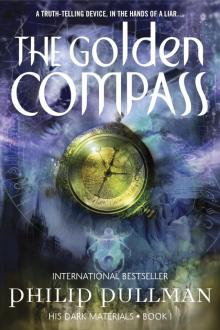 The Golden Compass
The Golden Compass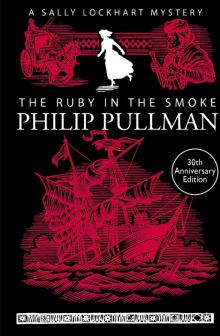 The Ruby in the Smoke
The Ruby in the Smoke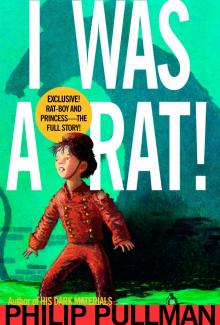 I Was a Rat!
I Was a Rat!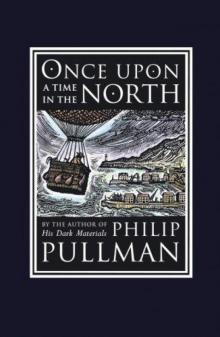 Once Upon a Time in the North
Once Upon a Time in the North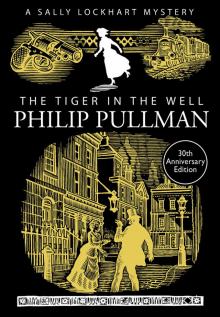 The Tiger in the Well
The Tiger in the Well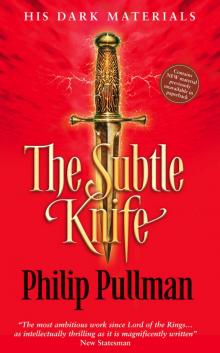 The Subtle Knife
The Subtle Knife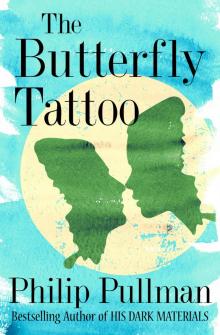 The Butterfly Tattoo
The Butterfly Tattoo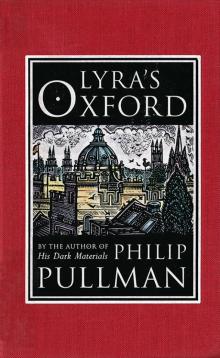 Lyra's Oxford
Lyra's Oxford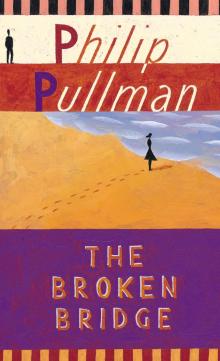 The Broken Bridge
The Broken Bridge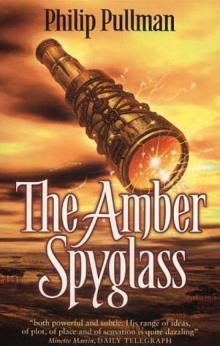 The Amber Spyglass
The Amber Spyglass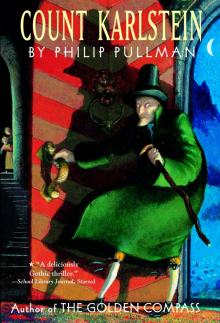 Count Karlstein
Count Karlstein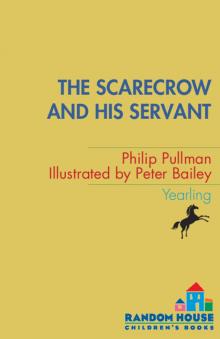 The Scarecrow and His Servant
The Scarecrow and His Servant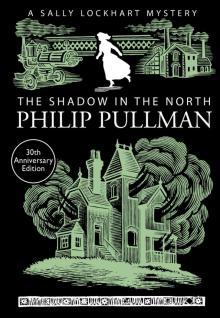 The Shadow in the North
The Shadow in the North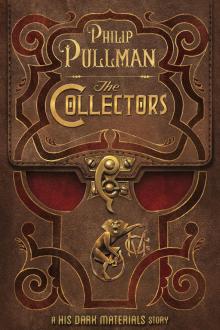 The Collectors
The Collectors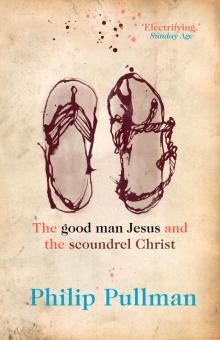 The Good Man Jesus and the Scoundrel Christ
The Good Man Jesus and the Scoundrel Christ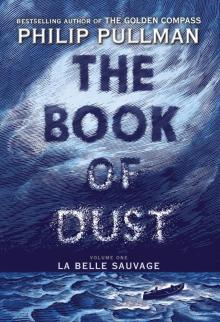 La Belle Sauvage
La Belle Sauvage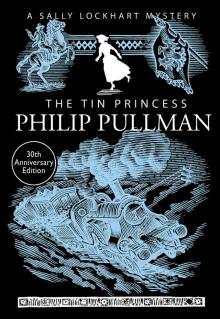 The Tin Princess
The Tin Princess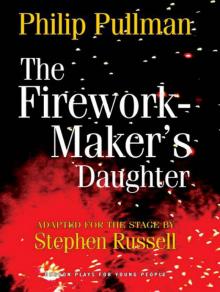 The Firework-Maker's Daughter
The Firework-Maker's Daughter The Book of Dust: The Secret Commonwealth (Book of Dust, Volume 2)
The Book of Dust: The Secret Commonwealth (Book of Dust, Volume 2)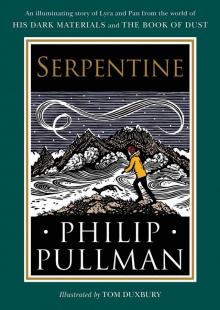 Serpentine
Serpentine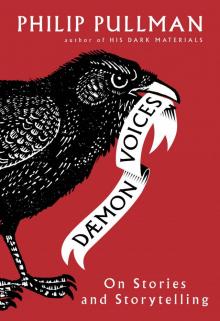 Daemon Voices
Daemon Voices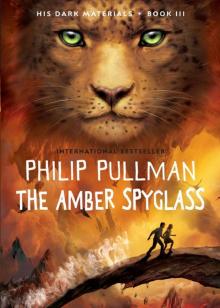 The Amber Spyglass: His Dark Materials
The Amber Spyglass: His Dark Materials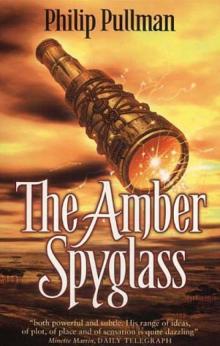 The Amber Spyglass hdm-3
The Amber Spyglass hdm-3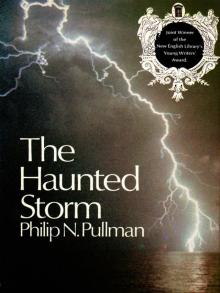 The Haunted Storm
The Haunted Storm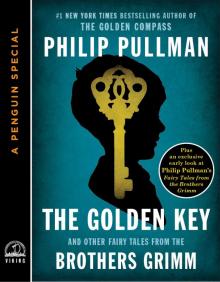 The Golden Key
The Golden Key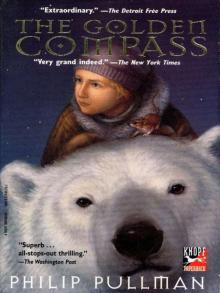 His Dark Materials 01 - The Golden Compass
His Dark Materials 01 - The Golden Compass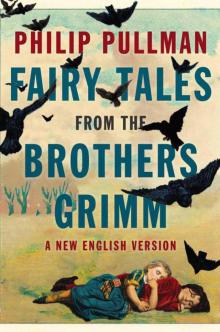 Fairy Tales from the Brothers Grimm: A New English Version
Fairy Tales from the Brothers Grimm: A New English Version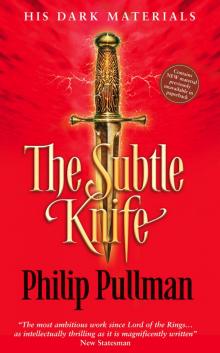 His Dark Materials 02 - The Subtle Knife
His Dark Materials 02 - The Subtle Knife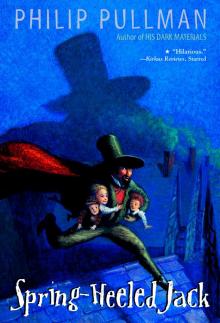 Spring-Heeled Jack
Spring-Heeled Jack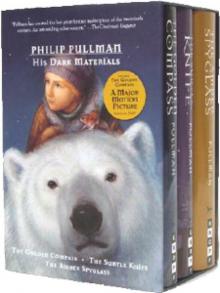 The Golden Compass hdm-1
The Golden Compass hdm-1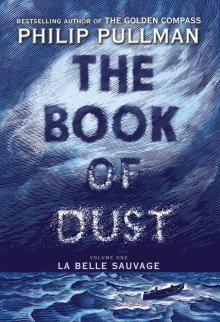 The Book of Dust, Volume 1
The Book of Dust, Volume 1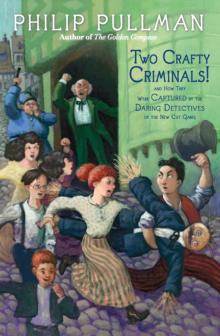 Two Crafty Criminals!
Two Crafty Criminals!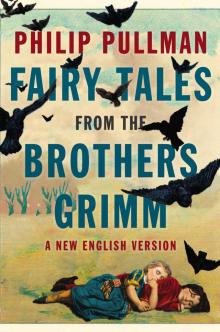 Fairy Tales from the Brothers Grimm
Fairy Tales from the Brothers Grimm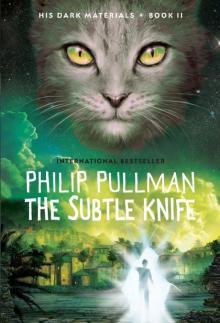 The Subtle Knife: His Dark Materials
The Subtle Knife: His Dark Materials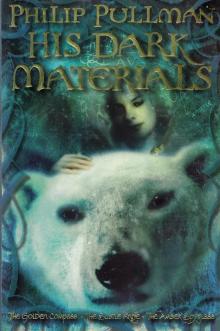 His Dark Materials Omnibus
His Dark Materials Omnibus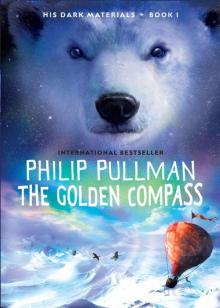 The Golden Compass: His Dark Materials
The Golden Compass: His Dark Materials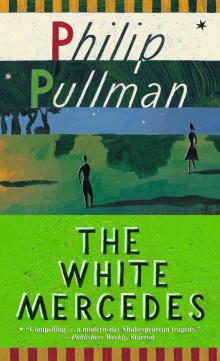 The White Mercedes
The White Mercedes